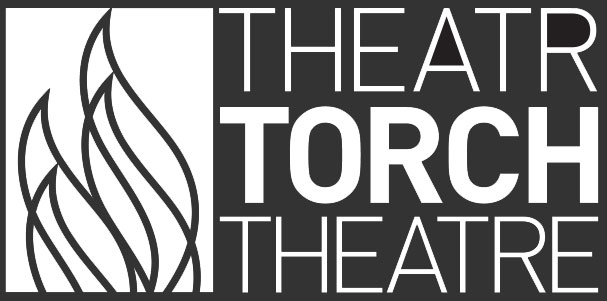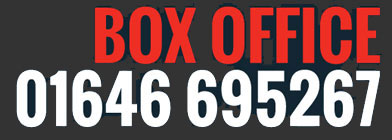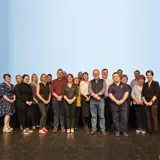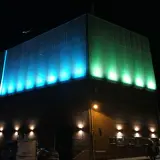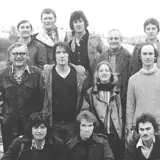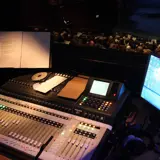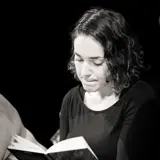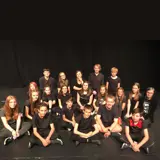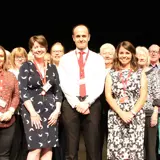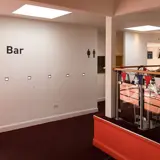HISTORY OF THE TORCH
In 1977, the cost of a colour TV license was £18, the average house cost £13,650, the Ford Cortina was Britain’s best-selling car, the Sex Pistols gate-crashed the Queen’s Silver Jubilee, Star Wars made its debut, becoming the highest grossing movie of the year…. And the Torch Theatre opened its doors for the first time.
The story of the Torch dates back to the mid 1960s, when Pembrokeshire County Council decided that it would have centres of excellence for various forms of leisure activities, one of which was the performing arts. The building of the Cleddau Bridge opened up a Pembrokeshire-wide audience for a new theatre, but it was a brave move to locate it in Milford Haven rather than the county town of Haverfordwest.
Work on the Torch Theatre began in 1973. The initial concept was a small community enterprise linked with a Further Education Centre in the adjacent building but due to the venue’s instant popularity, expansion became inevitable and it very quickly became a much larger project.
The theatre was designed by local architect, Monty Minter, with a main auditorium of 297 seats at a cost of £500,000, which was enabled by contributions from public bodies including the Welsh Arts Council, Pembrokeshire County Council, Wales Tourist Board, Milford Haven Town Council and AMOCO UK refinery, from whose logo the Torch took its name.
At an early stage during construction, it was decided that the theatre ought to be a producing rather than a receiving one, that being the only way to ensure a proper range of programming. This decision saw the formation of the Torch Theatre Company, and the original building plans upgraded to include a sizeable stage with fly-tower, subspace and versatile lighting perches.
The Torch Theatre first opened its doors in April 1977, as a multi-purpose venue, open seven days a week all year round, offering a wide range of events including regular films, performances of ballet, dance, opera, children’s shows, light entertainment and more.
Original artistic director Graham Watkins recalls: “One of the scariest times of my life was the opening of the Torch. During the lead-up to the first night, I used to lie awake in fear that we would open and the actors would be on stage, but the auditorium would be empty. It didn’t happen that way and the rest is history!”
With the establishment of a permanent repertory company, the Torch Theatre Company Limited was incorporated on 26 August 1977, and is now a not-for-profit, publicly-funded theatre and registered charity. The Torch Theatre Company’s first in-house production was Alan Ayckbourne’s Relatively Speaking in November 1977, followed by Nelson and Emma, a specially commissioned play by Robert Furnival. Directed by Graham Watkins, the play had a cast of eight including three professional actors, Joanna Field, Philip Rowlands and Peter Doran, the latter surviving being hanged on stage every night to become the current Torch artistic director.
In its first five years, the Torch Theatre Company produced over 40 plays, ranging from classics and comedy to farce and thrillers, presenting a wide range of plays and shows designed to appeal to all tastes. It also served the community by touring venues within the county with its own roadshow, and touring its productions throughout Wales. Of those early days, founder member Annie Pearson recalled, “We were a real repertory company – a group of actors brought together and staying together to appear in a wide variety of plays over many months.”
As Pembrokeshire's only professional theatre and one of only three building-based producing theatres in Wales, the Torch Theatre soon established itself as an unqualified success, recognised both locally and nationally with its production arm offering a range of classic and new dramas all year round and always-popular Christmas shows; attracting performers of the highest calibre. Over the past forty years, the Torch company has gone on to stage 150 productions, including shows that have toured internationally and performed at the Edinburgh Festival to award-winning acclaim.
In 1998 Peter returned to his home county to take over as Artistic Director of the Torch. Within a few years he set about a programme of development and expansion, resulting in a £5.4 million refurbishment and extension project in 2007, transforming the Torch Theatre into an accessible, comfortable and attractive place to enjoy entertainment and the arts, with a 300 seat Main House auditorium and 102 seat Studio Theatre (complete with state of the art digital cinema technology with 3D capabilities), bespoke art gallery, bar facilities and an attractive café. Its two screens show the best of arthouse, independent and British films every day, together with blockbusters, family films and live broadcasts, and currently offer over 1,000 shows, films, art exhibitions and live broadcasts annually to suit all tastes.
The Torch Theatre has survived into the twenty-first century when so many other venues have closed or ceased to be producing houses, and with so many arts venues nationwide adversely affected by cuts in funding to the arts. It owes its survival to the tireless enthusiasm of its staff, the dedication of its directors, actors, staff and volunteers, and of course, the continuing interest and affection the theatre generates amongst the people of Pembrokeshire and beyond.
Artistic Director Peter Doran says of the Torch’s longevity: “From day one we were told that the Torch had been built in the wrong place and over the years we’ve gone from one funding crisis to another but we’re still here and still doing well, so I see no reason why we shouldn’t be here for another forty years at least. We have a great loyal audience, it’s obvious that they want the Torch to be here, that’s why they support us so it’s onward and up!”
TORCH THEATRE NEWSLETTER
Get in the Spotlight!
Want to be the first to hear about upcoming performances, exclusive ticket offers, and behind-the-scenes action at the Torch Theatre? Subscribe to our newsletter and let the drama come to you.
